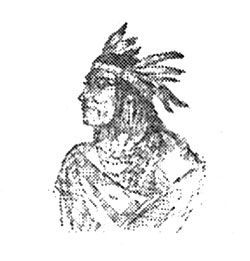George Campbell and the Black Boys
Author: Richard K. MacMaster
Date: 2012
Source: Ullans: The Magazine for Ulster-Scots, Nummer 12 Wunter 2011/12
Richard K. MacMaster

In March 1765 George Croghan, Deputy Superintendent for Indian Affairs, prepared to hold a treaty with the Shawnee and Delaware nations at Fort Pitt (now Pittsburgh) in western Pennsylvania. He ordered goods both as gifts for the Indians and for trade with them and had pack horses and drivers assemble at Henry Pawling’s tavern (present Greencastle) to carry them to Fort Pitt.
Scotch-Irish settlers on the Pennsylvania frontiers were understandably nervous about traders shipping arms and ammunition to their “inveterate enemies,” as they saw the Delaware and Shawnee. Ulster-born Justice William Smith insisted that all shipments be inspected and licensed by a magistrate and any weapons removed before a pack train could proceed west. This train of more than eighty pack horses was stopped and searched enroute before reaching Fort Loudon, where the drivers were warned to go no further. A large number of settlers had gathered meanwhile at Justice Smith’s (present Mercersburg), determined to block this shipment.
On the morning of March 6, armed men with faces blackened to resemble Indians on the warpath attacked the pack train at Sideling Hill (near present McConnellsburg). The drivers fled and the Black Boys, as they called themselves, destroyed the trade goods. The fugitive drivers raised the alarm at Fort Loudon and the commanding officer dispatched a patrol of the Black Watch, who arrested two of the Black Boys and seized the weapons of several more. Lieutenant Charles Grant promptly released the two prisoners but kept the guns.
This incident was the subject of a poem by George Campbell, an attorney who had arrived at Philadelphia not long before. Campbell was born in Newtownstewart and educated in Dublin, where he trained for a legal career. He was admitted to the bar at the Armagh Assizes. After settling in Philadelphia, Campbell practised law, engaged in commerce and invested in western lands with John Mitchell, a Philadelphia merchant originally from Glenarm. Among his landholdings, Campbell owned wilderness acreage near Sideling Hill. In 1770 he married Helen, daughter of merchant Hugh Donaldson, also from Glenarm. In later years Campbell served as Register of Wills for Philadelphia. He died there in 1811.
His poem was intended to be sung to the tune of “The Black Joke,” a bawdy song that originated in Dublin a generation earlier. Campbell’s poetry is on the level of other amateur verse published in the Philadelphia newspapers at that time. Its publication signaled the support the Ulster-born business and professional men of the city gave their brothers on the frontier, even when they violated the law.
Ye patriot souls who love to sing,
What serves your country and your king
In wealth, peace, any royal estates,
Attention give whilst I rehearse,
A modern fact, in jingling verse,
How party interest strove what it cou’d,
To profit itself by public blood,
But, justly met its merited fate.
Let all those Indian traders claim,
Their just reward, inglorious fame,
For vile base and treacherous ends.
To Pollins, in the spring they sent,
Much warlike stores, with an intent
To carry them to our barbarous foes,
Expecting that no-body dare oppose,
A present to their Indian friends.
Astonish’d at the wild design,
Frontier inhabitants combin’d
With brave souls, to stop their career,
Although some men apostatiz’d,
Who first the grand attempt advis’d,
The bold frontiers they bravely stood,
To act for their King and their country’s good,
In joint league, and strangers to fear.
On March the fifth, in sixty-five,
Their Indian presents did arrive,
In long pomp and cavalcade,
Near Sidelong Hill, where in disguise,
Some patriots did their train surprise,
And quick as lightning tumbled their loads,
And kindled them bonfires in the woods,
And mostly burnt their whole brigade.
At Loudon, when they heard the news,
They scarcely knew which way to choose,
For blind rage and discontent;
At length some soldiers they sent out,
With guides for to conduct the route,
And seized some men that were trav’ling there,
And hurried them into Loudon where
They laid them fast with one consent.
But men of resolution thought,
Too much to see their neighbors caught,
For no crime but false surmise;
Forthwith they join’d a warlike band,
And march’d to Loudon out of hand,
And kept the jailors pris’ners there,
Until our friends enlarged were.
Without fraud or any disguise.
Let mankind censure or commend,
This rash performance in the end,
Then both sides will find their account.
’Tis true no law can justify,
To burn our neighbors property,
But when this property is design’d
To serve the enemies of mankind,
It’s high treason in the amount.
Next: Tha Moss
Previous: Tha Guid Buik
Contents: Ullans: The Magazine for Ulster-Scots, Nummer 12 Wunter 2011/12

